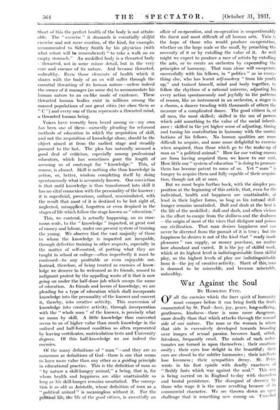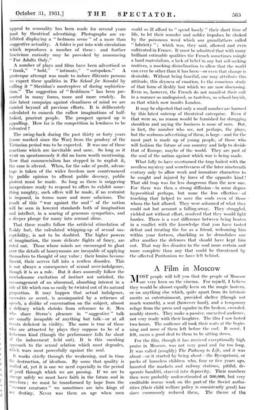War Against the Soul By HAMILTON FIFE.
OF all the enemies which the finer spirit of humanity must conquer before it can bring forth the fruits enumerated by St. Paul—love, joy, peace, long-suffering, gentleness, kindness—there is none more dangerous, more deadly than that which attacks through the sensual side of our nature. The man or the woman in whom that side is excessively developed towards brooding over images of sexual passion becomes hard, selfish, frivolous, frequently cruel. The minds of such- unfor- tunates are turned in upon themselves ; their emotions ossify ; their eyes lose delight in the beautiful ; their ears arc closed to the subtler harmonies ; their intellects lose keenness ; their sympathies decay. St. Peter wrote in his first epistle with deadly exactness of " fleshly lusts which war against the soul." This war is being carried on in England to-day with shameless and brutal persistence. The disregard of decency by those who wage it is the more revolting because of its commercial character. We sec thrown down an open challenge- that is something new among us: ' Unveiled appeal to sensuality has been made for several years past. by theatrical advertising. Photographs are ex- hibited displaying a " bedroom scene " of a more than suggestive actuality. A folder is put into wide circulation which reproduces a number of these : and further lascivious curiosity may be provoked by announcing "'For Adults Only."
A number of plays and films have been advertised as " frank," " bold," " intimate," " outspoken." A grotesque attempt was made to induce illiterate persons to expect these qualities in The School for Scandal by calling it "Sheridan's masterpiece of daring sophistica- tion." The suggestion of " fleshliness " has been pre- sented in many forms, more and more crudely. In this latest campaign against cleanliness of mind we are carried beyond all previous efforts. It is deliberately calculated to enmesh the callow imaginations of half- baked, prurient people. The prospect opened up is appalling: iiow far is the competition in lewdness to be tolerated ?
The swing-back during the past thirty or forty years (more marked since the War) from The prudery of the Victorian period was to be expected. It was one of those reactions which are inevitable and sane. So long as it went on spontaneously it did no harm worth mentioning.
Now that commercialism has stepped in to exploit it, the case is altered. When, for the sake of profit, advan- tage is taken of the wider freedom now countenanced by public opinion to affront public decency, public protest must be made. So long as there is sniggering inexperience ready to respond to offers to exhibit some- thing naughty, such offers will be made, if no restraint is imposed, in terms more and more salacious. The result of this " war against the soul " of the nation will be seen in lowered standards both of imagination and intellect, in a searing of generous sympathies, and a deeper. plunge for many into sensual slime. .
That these results follow the artificial stimulation of fleshly lust, the calculated whipping-up of sexual sus- ceptibility, is not to be doubted. The higher powers of imagination, the more delicate flights of fancy, are ruled out. Those whose minds are encouraged to gloat over the details of honeymoons are incapable of applying themselves to thought of any value ; their brains become flaccid, their nerves fall into a restless disorder. This is not always a consequence of sexual over-indulgence, though it is as a rule. But it does assuredly follow the unwholesome excitation of instinct not satisfied, the encouragement of an abnormal, absorbing interest in a side of life which can so easily be twisted out of its natural proportion. It may happen that actual indulgence, excessive or secret, is accompanied by a reticence of speed); a dislike of conversation on the subject, almost a deliCaay which shrinks from reference to it. Men who share Sterne's pleasure in " suggestive " talk are usually incapable of anything but talk—or at all events deficient in virility. The . same is true of those who are attracted by plays they suppose to be of a lecherous kind (though the performance falls far short of the inducement held out). It is this sneaking approach to the sexual relation which most degrades, which wars most powerfully against the soul.
It worki chiefly through the weakening, and in time the destruction, of idealism. By some that quality is scoffed at,'yet it is one we need especially in the period of peril through which we are passing. If we are to emerge safely we must have faith in the future and in ourselves ; we must be transformed by hope from the meaner creatures " we sometimes are into . kings of our destiny.. Never. was there an age when . men could so ill afford to " spend basely" their short time of life, to let their sounder and nobler impulses be choked by the poisonous weed which our grandfathers called " lubricity " ; which was, they said, allowed and even cultivated in France. It must be admitted that with many brilliant estimable qualities the French sometimes mingle a hard materialism, a lack of belief in any but self-seeking motives, a mocking disinclination to allow that the world can ever be other than it has been—or even that change is desirable. Without being fanciful, one may attribute this attitude, this dryness of emotion, to the conscious study of that form of fleshly lust which we arc now discussing. Even so, however, the French do not manifest their cult in a manner so undisguised, so tasteless, so school-boyish, as that which now insults London.
It may be objected that only a small number are harmed by this latest outcrop of theatrical enterprise. Even if that were so, no reason would be furnished for shrugging shoulders and saying the business is none of ours. But, in fact, the number who sec, not perhaps, the plays, but the scabrous advertising of them, is large—and for the most part is made up of young people, of those who will fashion the future of our country and help to decide that of Europe, maybe of the world. They are part of the soul of the nation against which war is being made. - What folly to have overturned the trap baited with the needless mystery and secretiveness of the later nineteenth century only to allow weak and immature characters to be caught and injured by lures of the opposite kind ! That old trap was far less dangerous than the new one. For there was then a strong diffusion—in some degree hypocritical perhaps, but none the less effective—of teaching that helped to save the souls even of those • whom the bait allured. They were ashaincd of what they could not but account a falling-away. They struggled, yielded not without effort, resolved that they would fight harder. There is a vast difference between being beaten in a conflict with the knowledge that you have tasted defeat and treating the foe as a friend, welcoming him within your fortress, chuckling as he demolishes one after another the defences that should have kept him out. That way lies disaster to the soul more certain and more complete than any that could be threatened by- the affected Puritanism we have left behind.







































 Previous page
Previous page